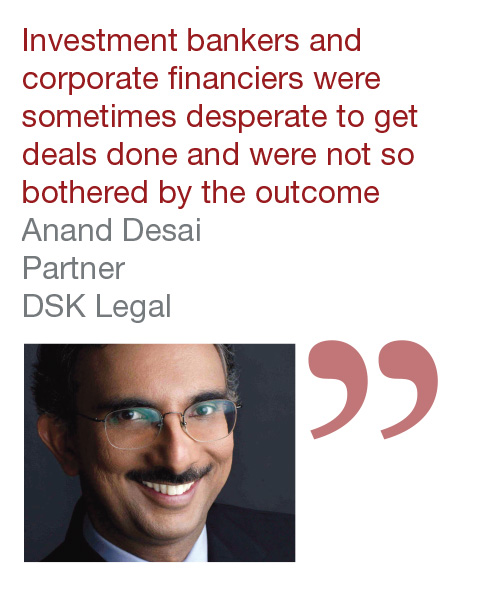Following a battering in the financial storm, private equity is once again showing signs of life. A new emphasis on risk mitigation means lawyers will play a key role in its recovery. Chris Crowe reports from London
Amid the private equity frenzy of 2007, Anand Desai, a partner at Mumbai-based DSK Legal, became deeply disillusioned. “There were too many funds chasing too few opportunities,” he recalls. US$3.6 billion of private equity flowed into India during 2007, according to a report by consultants Bain & Co, but what caused Desai the greatest alarm was the speed with which deals were being closed.
“We were once asked to complete a due diligence and the documentation in an unrealistic period of three days. It’s not a smart thing to do,” he explains.
Desai, whose clients include the private equity arms of Deutsche Bank, ABN Amro and several other financial institutions, had heated discussions with the head of one investment bank. He accused the banker’s subordinates of outrageous “immaturity”, indicating that their irresponsible behaviour might result in severe difficulties at a later date.
“Investment bankers and corporate financiers were sometimes desperate to get deals done and were not so bothered by the outcome,” he says.
The losses suffered by private equity funds in the wake of the economic downturn suggest that Desai’s fears were well founded.
Private equity investors and lawyers have always been strange bedfellows. Private equity houses embrace risk, while lawyers are averse to it.
Since the dramatic downturn, investors have come to see the value of lawyers’ prudence. “There’s definitely a more cautious approach towards transactions,” observes Cyril Shroff, managing partner of the Mumbai office of Amarchand Mangaldas.
Volatility in a unique market
Private equity houses tend to operate differently in India than in other parts of the world. In Europe and the US, private equity funds regularly buy into, and take control of, mature and ailing companies. The companies are renovated and streamlined through the introduction of new management and new ideas before being sold, hopefully for a considerable profit.
In India many companies are still family owned, and so are particularly reluctant to cede control to investors. Private equity funds have tended to take relatively smaller stakes in growth companies, hoping to make money on their gradually inflating share price, or on an eventual initial public offering if the company is not already listed.
Since the collapse of the stock markets in 2008, these strategies have largely failed. At the Bombay Stock Exchange, the oldest bourse in Asia, thrilling highs were suddenly succeeded by calamitous lows. Its Sensex index soared past the 20,000 mark in October 2007; a year later it stood at less than half that figure. According to a report by the brokerage SMC Capital, investments made by private equity firms in 2007 lost 60-70% of their value in 2008.
You must be a
subscribersubscribersubscribersubscriber
to read this content, please
subscribesubscribesubscribesubscribe
today.
For group subscribers, please click here to access.
Interested in group subscription? Please contact us.



























